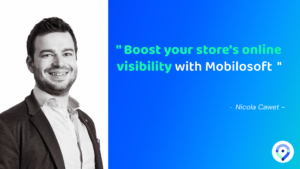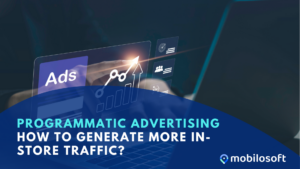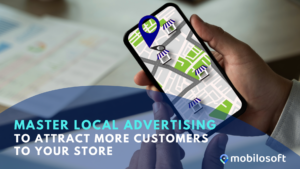Prediction: Local searches will no longer be just about being present on Google Business Profile (formerly Google My Business). By 2025, consumer expectations will have evolved: they will seek even faster, more personalized results directly tailored to their location and immediate needs. To stand out in this increasingly complex environment, marketers will need to adjust their strategies.
This article explores the key trends shaping the future of local search and provides concrete approaches to help businesses stay ahead in the optimization of their store listings.
- Personalization through AI: how local search will evolve by 2025
- Improving local advertising: strategic optimizations for higher impact
- Leveraging Apple Business Connect and Bing Places for local business visibility
- Advanced local SEO and store locators: essential tools for your 2025 strategy
- Building customer loyalty through seamless omnichannel engagement
- Key takeaways for your 2025 digital marketing and SEO practices
Personalization through AI: how local search will evolve by 2025
By 2025, personalizing local searches using artificial intelligence will become essential to capture and retain consumers. Leveraging machine learning will enable continuous processing and analysis of local information to anticipate users’ needs.
How to integrate AI effectively:
- Predictive analysis: Analytics tools will better understand local trends and adjust content and offers based on what is most sought after in a specific geographical area. For example, a sports store chain could analyze local searches and identify a high demand for skiing equipment in a particular region as winter approaches. Using this data, they can adjust their local marketing campaigns by highlighting targeted promotions on ski equipment, increasing stock in-store, and tailoring offers to local preferences.
- Real-time personalization: Dynamically adapting product recommendations and offers based on purchasing behavior, site visits, or even specific conditions like local weather will become a necessity.
- Intelligent virtual assistants: Integrating advanced chatbots will facilitate managing customer inquiries in real-time while analyzing frequently asked questions to enhance the information available on eCommerce sites or apps.
- Precise audience segmentation: AI will enable a more detailed audience segmentation based on past behaviors, interactions, and local demographic data. This refined targeting will increase the relevance of messages sent to consumers.
These tactics, driven by AI, will enhance user experience while boosting the effectiveness of offers presented to customers—key factors for success in the coming years.
Improving local advertising: strategic optimizations for higher impact
Local ads will become more sophisticated thanks to refined targeting technologies. By 2025, optimizing local campaigns will require a more strategic and automated approach.
Strategies to boost local ad performance:
- Google Performance Max campaigns: These automated campaigns will use learning algorithms to allocate advertising budgets optimally across various channels (search, YouTube, Maps, etc.). To maximize their impact, companies must provide comprehensive product data, including precise descriptions and high-quality visuals. Additionally, businesses can integrate programmatic media like DOOH (Digital Out Of Home) to reach consumers via digital displays in public places (public transport, shopping malls). DOOH provides strong visibility, especially among local audiences on the move.
- Dynamic geographic targeting and message personalization: Ads should be created based on users’ exact locations, taking into account their travel habits, local events, and even personal preferences. Dynamically targeting these users will make campaigns more relevant, thus increasing conversion rates.
Combining these strategies will help companies capture users’ attention, drive action, and minimize costs—essential components for effective local ad campaigns.
Leveraging Apple Business Connect and Bing Places for local business visibility
In 2025, Apple Business Connect and Bing Places will become essential platforms for local businesses looking to enhance their visibility. Apple Business Connect will enable brands to manage their presence on Apple Maps, Siri, and other Apple services, while Bing Places, integrated with ChatGPT, will offer unique interactions with virtual assistants and conversational search tools.
To fully leverage these platforms, it will be crucial to regularly update information such as hours of operation, services, and specific offers. Bing, particularly with its AI capabilities and integration with ChatGPT, will enable companies to interact more dynamically with user requests and provide real-time local information through conversational interfaces.
By mastering these platforms, businesses will be able to effectively increase their visibility and interact more efficiently with their audiences.
Advanced local SEO and store locators: essential tools for your 2025 strategy
Local SEO will be critical in 2025 to ensure search engines correctly display business information. It’s not just about appearing in results but ensuring those results include all the relevant information users are seeking.
Local SEO best practices to implement:
- Detailed descriptions: Each business page should include precise and complete descriptions of services offered. These descriptions must be unique, avoid duplicate content, and include specific local keywords to maximize visibility.
- High-quality photos and visuals: Images will play a central role in local SEO. Businesses should add high-quality photos of their stores, products, and services, optimized for search with relevant filenames and descriptive ALT tags. This will help them appear in image search results and enhance the appeal of local listings.
- Up-to-date hours and real-time information: Business hours and other essential information (such as exceptional closures or specific services) should be regularly updated. These details should be visible on local pages and properly synchronized with platforms like Google Business Profile or Bing Places.
- Customer reviews and ratings: Embedding and displaying customer reviews directly on local pages will increase trust and improve SEO. Google considers the quality and quantity of reviews to determine a business’s relevance in local searches.
In parallel, store locators should be well-designed to ensure a smooth user experience. These tools should enable users to easily find the nearest store while providing accurate information such as business hours, directions, and available services.
Tracking local campaign performance: measuring success with accurate KPIs
By 2025, accurately measuring the impact of local campaigns will be crucial for staying competitive. Traditional metrics like clicks or impressions will no longer suffice. The focus will shift to KPIs specific to local actions, such as calls, route requests, or store visits.
Businesses will need advanced analytics tools to track these actions precisely and identify the most effective campaigns. Data from local advertising can then be used to improve local SEO, and vice versa—a well-executed SEO strategy can reduce advertising costs and maximize results.
Building customer loyalty through seamless omnichannel engagement
Customer experience will need to be consistent across various communication channels. Consumers will switch more easily between online and physical stores, making it vital to ensure continuity in their interactions.
Strategies to boost omnichannel engagement:
- Channel synchronization: Companies must ensure their marketing messages, promotions, and product information are unified across both digital and physical channels. This synchronization will create a more personalized experience and help meet customer expectations in real-time.
- Use of customer reviews: Online reviews will play an increasingly important role in strengthening local businesses’ credibility. Encouraging customers to share their feedback will improve brand image while attracting new prospects.
- Integrated loyalty programs: Implementing loyalty programs that work both online and in-store will reward customers at every touchpoint and encourage long-term loyalty.
By 2025, a consistent omnichannel strategy will help strengthen customer relationships, increase engagement, and ensure lasting loyalty—becoming a core component of future marketing efforts.
Key takeaways for your 2025 digital marketing and SEO practices
- Personalization through AI: AI tools will be crucial to improve local user experience and offer tailored solutions to meet the specific expectations of each customer.
- Optimization of local advertising: Leveraging dynamic targeting technologies and automated bidding, local campaigns can maximize their efficiency while minimizing costs.
- Apple Business Connect and Bing Places: These platforms will play a key role in enhancing local business visibility, with options such as push notifications and advanced analytics tools.
- Local SEO and store locators: Optimizing the structure of local data and improving store locator interfaces will help businesses stand out in local search results.
- Measuring local conversions: Using analytics tools to precisely track local actions and co-optimizing SEO with advertising will ensure better ROI and more conversions.
- Omnichannel engagement: Channel synchronization and integrating loyalty programs both online and in-store will strengthen customer relationships and boost long-term engagement.
Need help getting started?




